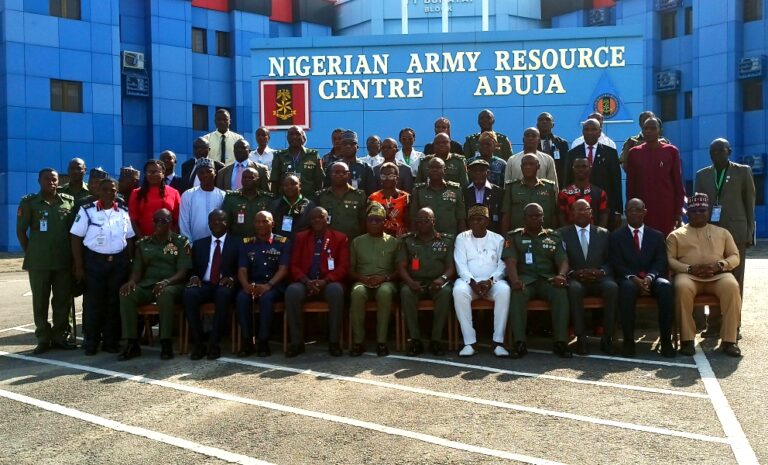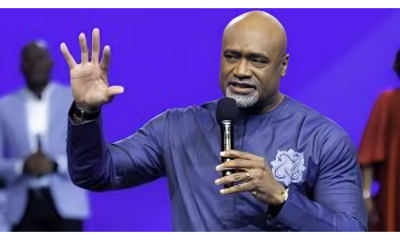NEWS
Why Army Must Select Recruits with Physical Strength, Intellectual Capacity – Experts

Some serving and retired army generals have emphasised the need for the Nigerian Armyto select recruits with both physical strength and intellectual capacity to meet future operational demands.The views were canvassed at a one-day Nigerian Army Military History Seminar organised by the Nigerian Army ResourceCentre (NARC) on Tuesday in Abuja, with the theme “Military History and Decision Making in the Nigerian Army Drawing Lessonsfrom the Past Challenges and Prospects.
”Retired Maj. -Gen. Stephenson Olabanji who delivered a paper on “Nigerian Army’s Cultural Evolution Since 1863”, said the army was onceconsidered a place for the dregs.He added that little emphasis was placed on educational qualifications of enlisted men at inception, saying that the army was seen as a placefor generally brutal persons.Olabanji said that the force had, however, metamorphosed into a highly educated upwardly mobile band of professionals across all facets of learning.He explained that “the current Nigerian army is making commendable strides to modernise the force.”He emphasised that recruitment must be enhanced with improved processes to be able to achieve an ideal soldier.According to him, recruitment system should be up-scaled with heightened emphasis on physical fitness, mental toughness, strategic thinking andadaptability to diverse operational environment.“This is because future battlefield will not only require physical strength, but intellectual capacity and emotional resilience.“The concept of ideal soldier is central to Nigerian army’s vision for operational success, while the skills and competences of the ideal soldier must align with Nigeria’s national interest.“Ideal soldiers function as cohesive and highly effective force in pursuit of national interest.“Ideal soldier is expected to exhibit profound love for homeland because love for country translates to readiness to defend the country at all cost, soldier with strong patriotism likely to uphold Nigerian army’s values and contribute to successes,’’ he added.In his remarks, Retired Maj.-Gen. Ahmed Jibrin, the Special Assistant, Technical to the Minister of Defence, said the seminar would help to expose soldiers to lessons learnt from past wars and battles fought.Jibrin said it was not enough for the military to prepare and go to war but having it in mind that some of the plans made might not come true.According to him, each and everyone of the principles of war is derived from the lessons learned in history.“And so, since we are using the principle to fight the present war and even the future war, then it is necessary for us to know that without history, we cannot build today and the future.“In the past, these technological advancements were not in the stage, but the lesson of history has taught us that things will not continue to be as they used to.“Nations will continue to strive to make efforts to come up with more modern ways and means of dealing with security situations confronting them.”The Deputy Chief of Training (Training and Exercise), Army, Maj.-Gen. Musa Etsu-Ndagi, said the soldier of the future must be a smart soldier that should be well-educated.Etsu-Ndagi said such a soldier should be in tune with realities of the time such as technology, to be able to navigate the battlefield of the future.He said the seminar was organised to bring participants up-to-speed and be attuned to current realities and brace up for the future battlefield.The Director-General of NARC, Retired Maj.-Gen. Garba Wahab, described the seminar as an “indirect approach training to look at what was being done right from lessons learnt from the past.”Wahab said that the first seminar had been of immense benefit to the army, adding that the second edition was expected to help them come up with lessons and gaps needed to be filled.According to him, it is not just for the soldier to be physically fit and man the weapon, but ability to relate with the community, and be able to communicate effectively.He said “it goes beyond handling of weapons because that weapon is being held in trust for Nigerians to be able to secure them.“So, we have to find a way of ensuring that trust is built between not only the army, but all the security agencies and the community they are securing.”(NAN)NEWS
DHQ Rebuts Allegation of Internal Sabotage in Benue Massacre

The Defence Headquarters (DHQ) has dismissed the allegation suggesting that internal sabotage within the Nigerian military contributed to the tragic events in Yelwata, Benue.The Director of Defence Information, Brig.-Gen. Tukur Gusau, in a statement on Tuesday, said the claims were unfounded and not supported by credible evidence.
Gusau said the Nigerian military had consistently denied any involvement in the massacre. According to him, the Chief of Defence Staff (CDS), Gen. Christopher Musa, has publicly stated that the military was not responsible for the killings in Yelwata.“Furthermore, the Nigerian Military has emphasized its commitment to protecting civilians and upholding the rule of law.“There is no credible evidence to substantiate claims of internal sabotage within the military related to the Yelwata incident.“Investigations by independent bodies, including human rights organizations, have not found any links between the military and the perpetrators of the massacre.“The violence in Yelwata is part of a broader pattern of intercommunal clashes in Nigeria’s Middle Belt region, primarily between farmers and herders.“These conflicts are driven by longstanding disputes over land and grazing rights, ethnic tensions, and competition for resources,” he said.Gusau said that while the military had been deployed to maintain peace, the root causes of the violence lied in complex socio-economic and political factors.He added that attributing the Yelwata massacre to internal sabotage within the Nigerian military was misleading and detracts from the real issues at play.According to him, it is essential to focus on addressing the underlying causes of intercommunal violence and to support efforts aimed at fostering dialogue, reconciliation, and sustainable peace in the affected regions.“The CDS has only called for a holistic approach and the need for the cummunities and the security agencies to work closer to address the issue.“He also call on the communities not to hide criminals and also assure them the military ans other security agencies are there to protect lives and properties of law abiding citizens,” he added. (NAN)NEWS
Benue killing: NAF Deploys More Air Assets in Op Whirl Stroke

As part of sustained efforts to restore peace and stability across the North Central region, the Nigerian Air Force (NAF) has deployed additional air assets under Operation Whirl Stroke (OPWS).This is contained in a statement by the Director, Public Relations and Information, NAF, Air Commodore Ehimen Ejodame, on Tuesday in Abuja.
Ejodame said the strategic move had reinforced the NAF’s commitment to enhancing security, supporting ground operations, and reassuring communities affected by banditry, kidnapping, and communal unrest. He said the Chief of the Air Staff (CAS), Air Marshal Hasan Abubakar, conducted a firsthand evaluation of air operations under OPWS, to assess the effectiveness of these expanded efforts.According to him, the visit included a high-level strategic engagement held on Tuesday, at the Headquarters Tactical Air Command, Makurdi.Ejodame said the Chief of Army Staff, Lt.-Gen. Olufemi Oluyede; a representative of the Chief of the Naval Staff, Rear Adm. Olusegun Ferreira; the Commander of OPWS; and the Maritime and Air Component Commanders, alongside other key stakeholders, were part of the meeting.According to Ejodame, critical updates were provided on the current tempo of joint operations aimed at restoring lasting peace across the region.In his remarks, the CAS revealed that the newly deployed air assets had been successfully integrated into ongoing operations, delivering real-time intelligence and precision targeting support.He stated NAF aircraft had continued to conduct surveillance, armed reconnaissance, close air support, and precision strike missions with remarkable success.Abubakar noted that the current deployment aligns with the Federal Government’s overarching mission to stabilise the Middle Belt region.He highlighted the impact of recent coordinated air and ground operations across Benue, Nasarawa, and Taraba States, which have led to the dismantling of several militia camps, bandit enclaves, and criminal hideouts.“These outcomes reinforce our unwavering commitment to protecting innocent lives and supporting national peace-building initiatives.“As long as peace is threatened, our resolve remains unshaken.“The NAF will continue to deliver timely, decisive air support in synergy with sister services, ensuring the protection of lives and properties while advancing our mission of restoring peace to the Middle Belt and beyond,” he said.The Service Chiefs jointly emphasised the importance of synergy among the armed forces and other security agencies, noting that jointness remains a cornerstone for operational success under Operation Whirl Stroke.They reiterated that the ongoing operations are part of a broader goal to create a secure environment where residents can live and conduct their legitimate activities without fear. (NAN)NEWS
Tinubu Reiterates Commitment to Fast-Track Approvals for Viable Projects

President Bola Tinubu, on Tuesday restated the determination of his administration to fast-track approvals for viable infrastructural projects in the country.Tinubu, represented by Vice President Kashim Shettima, made this known at the 2025 Nigeria Public-Private Partnership (PPP) Summit on Tuesday in Abuja.
The president therefore urged private sector partner to be focused and more committed. According to him, what matters to the average Nigerian is the availability of basic infrastructure such as power, roads, health facilities and quality schools. He called for a more strengthened public-private sector partnership that emphasises innovation, efficiency, commitment and integrity above mere capital and investments.” We need more than investment. We need innovation, we need efficiency, and above all, we need integrity.” I urge you to look beyond the risks and recognise the immense opportunity to shape a nation that is not just rising, but ready.“The projects that emerge from this summit must not gather dust on paper or linger in bureaucratic limbo.” We will fast-track approvals for viable projects. We will ensure coordination across Ministries, Departments, and Agencies to enable swift implementation.“We do this because we know that what matters to the average Nigerian is not promises, but power in their homes, roads to their farms, access to clean water, modern hospitals, and quality schools. We must build.” We must deliver. And we must do it together,” he said.He observed that a 21st-century economy cannot be built on 20th-century infrastructure, pointing out that the “old model of public-only infrastructure funding is no longer sustainable.“Our national aspirations far exceed what public budgets alone can deliver. That is why we must innovate, and why we must work together.” We are not looking for investors to carry burdens. We are offering opportunities to create value.” We seek long-term partners who are ready to help us bridge our infrastructure gap with purpose and precision,” he added.Tinubu recalled that his administration, on assumption of office two years ago, was quite aware “that a functional relationship between the public and private sectors would be the magic wand of transformation.”He reaffirmed that the administration was still fully committed to that very public-private partnership that is passionate about delivering sustainable and inclusive infrastructure.” We have strengthened the Infrastructure Concession Regulatory Commission and enhanced its capacity to regulate, superintend, and de-risk PPP transactions.” We are determined to deliver infrastructure that is both sustainable and inclusive. Our economic reforms have laid a stable foundation.” From the removal of unsustainable subsidies to the liberalisation of the foreign exchange regime and the optimisation of government revenues, we have acted boldly and responsibly.“We are streamlining bureaucratic bottlenecks and improving transparency in our project pipelines.” We have aligned our processes with global best practices and investor expectations.”The President urged participants to ensure the event is “remembered not for fine speeches, but for bankable projects, signed deals, and enduring progress.”The Minister of Interior, Mr Tunji Ojo, commended the ICRC for championing game-changing projects across diverse sectors.Ojo noted that with President Tinubu and Vice-President Shettima in the saddle, Nigeria is taking its rightful place in the comity of nations.The Regional Director, Central Africa and Anglophone West Africa, IFC, Dahlia Khalifa, applauded the ongoing reform in Nigeria’s PPP framework.Khalifa acknowledged IFC’s collaboration with authorities across key sectors to achieve the country’s overall objectives and strengthening the existing relationship between the organisation and Nigeria.She added that Nigeria under President Tinubu has demonstrated strong commitments to timely and transparent resolution of disputes arising from PPP projects.Solomon Quaynor, the Vice President for Private Sector, Infrastructure and Industrialisation at the African Development Bank, said the theme of the summit implies that partnerships are not just optional but are essential.He said the infrastructure deficits “demand that the government and the private sector work together in commercially viable PPPs.”Quaynor added that the bank was working with other partners on the Lagos-Abidjan highway project to boost regional economic integration in West Africa.“PPPs are complex long-term projects. They need to be designed properly and designed to survive different political administrations because by their very nature, they are long-term,” he stated. (NAN)


















